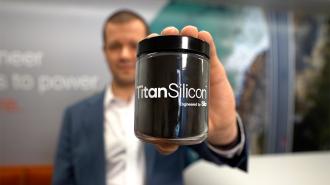A new silicon anode material for batteries promises to boost the range of electric vehicles (EVs) by 20% or more — and a major automaker has already signed a deal to start using it.
Range anxiety: A widespread transition to EVs would slash the world’s greenhouse gas emissions, but the switch from gas- and diesel-powered cars and trucks is slow — in 2022, only 13% of new cars sold worldwide were electric.
While higher upfront costs often factor into this decision, the primary issues keeping people from buying EVs have to do with their batteries — many drivers are concerned that EVs won’t have sufficient range to get them where they need to go.
Silicon can hold more energy than graphite in the same amount of space.
What’s new? Battery firm Sila Nanotechnologies has now unveiled Titan Silicon, a new material for EV batteries, which it says can boost a vehicle’s range by 20%, while reducing a 60-minute charge time down to as few as 20 minutes.
“With the wide adoption of EVs, consumers are looking for best-in-class solutions that deliver best-in-class performance, and our solutions provide just that: longer range and faster charge,” said Gene Berdichevsky, Sila’s co-founder and CEO.
How it works: Titan Silicon is designed for use in anodes, the part of a battery that releases electrons during discharge. In lithium-ion batteries, the anode is typically made of graphite, but Sila’s powdery anode material is silicon-based.
Silicon can hold more energy than graphite in the same amount of space, which has made it an alluring substitute for EV batteries — Tesla has been looking into it since at least 2015 — but silicon also expands and contracts during use in a way that can quickly degrade the battery.
“We’ve gone through over 70,000 iterations of this material.”
Gene Berdichevsky
To overcome that limitation, Sila designed its silicon anode particles to be encapsulated in a scaffold-like structure that limits their expansion.
“We’ve spent over a decade in the labs,” said Berdichevsky. “We’ve gone through over 70,000 iterations of this material — researching different recipes, different configurations, different formulations, how to build it into different types of cells — and ultimately landed on some recipes that worked really, really well.”
Looking ahead: According to Sila, Titan Silicon is 100% compatible with any existing battery cell design — cylindrical, pouch, etc. — and automakers could even choose to replace just some of the graphite in their anodes with the material, if that better suits their needs.
Sila plans to begin mass producing Titan Silicon in 2024, and within the next five years, it expects to manufacture enough for one million EV batteries. The first automaker to adopt the tech will be Mercedes-Benz — it will use Titan Silicon in the batteries for its EQG G Wagon, which is expected to debut in late 2024 or early 2025.
Sila doesn’t plan to stop innovating, either — Berdichevsky believes the company will be able to squeeze even more benefits from its silicon anode material.
“What we see is we’ll be able to deliver more like a 40% increase in range over time — well over 100 miles additional — and bring the charge times we think below 10 minutes, which is about how long you spend at a gas station,” he said.
The big picture: It’s possible silicon anodes could prove to go well beyond that. A team in South Korea recently published a study of its own silicon anode material that it says could lead to a 10-fold increase in an EV’s range.
It’s too soon to say whether their material will be able to make the leap from the lab to the streets, but if Titan Silicon can deliver on its promise, range anxiety might soon be struck from the list of reasons to put off buying an EV.
We’d love to hear from you! If you have a comment about this article or if you have a tip for a future Freethink story, please email us at [email protected].






